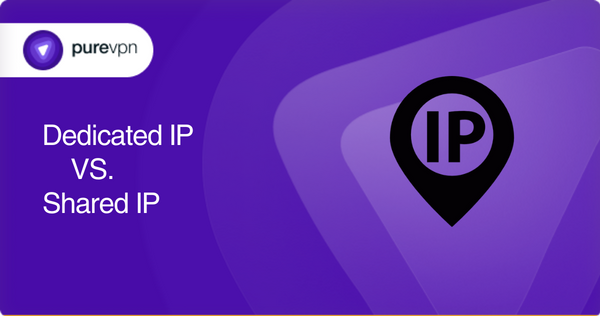Table of Contents
Your IP address is like your digital fingerprint, uniquely identifying it to the online world. But when choosing between a dedicated IP or a shared one, things can get more complicated.
In this blog, we will take a closer look on dedicated IP vs shared IP including the pros and cons of each option, so you can decide which one fits your needs and budget.
But before we can move forward, let’s understand what dedicated and shared IPs mean.

What is dedicated IP?
A dedicated IP is an internet protocol (IP) address exclusively assigned to a single hosting account or website. That particular account or website has a unique IP address, and only certain people can access it.
Businesses or websites requiring specific features, such as private SSL certificates or custom DNS records, commonly use dedicated IPs.
Additionally, dedicated IPs may help to improve a website’s reputation and provide better email deliverability, as they are less likely to be associated with spam or other suspicious activities that may occur on shared IPs.
What is shared IP?
A shared IP (Internet Protocol) address works and assigns to multiple devices or users on a network rather than a single device or user. It means various devices or users share the same IP address to access the internet.
It is commonly used for hosting multiple websites on the same server in web hosting. In this case, all the websites hosted on the server share the same IP address but have unique domain names for identification.
A shared IP address can have advantages in terms of cost efficiency and ease of management, but it can also have drawbacks, such as reduced privacy and security. For example, if one website hosted on a shared IP address is flagged for malicious activity, it can affect other websites’ reputations.
Dedicated IP vs Shared IP: The key differences
Dedicated IP vs Shared IP – Shared and dedicated IP addresses are two different types of configurations with key differences regarding their advantages, disadvantages, and use cases. Here are some of the key differences between shared and dedicated IP addresses:
Usage
A shared IP address is used by multiple devices or websites, whereas a dedicated IP address is used exclusively by a single device or website.
Reputation
The reputation of a shared IP address is influenced by all the devices or websites sharing the same IP address. In contrast, the importance of a dedicated IP address solely depends on the activity of the single device or website.
Security
A dedicated IP address is more secure than a shared IP address. There is no possibility of other devices or websites sharing the same IP address flagged for malicious activity.
Performance
A dedicated IP address can perform better than a shared IP address. There is no risk of other devices or websites on the same IP address consuming resources and affecting performance.
Cost
A shared IP address is typically less expensive than a dedicated IP address since multiple devices or websites on the same server can share it.
Administration
A dedicated IP address requires more administration and management than a shared IP address. It is because it is exclusively assigned to a single device or website and requires a specific configuration.
The choice between shared or dedicated IP addresses depends on the user’s or organization’s specific needs, budget, and security requirements.
How do I know whether I need a shared or dedicated IP address?
Whether you need a shared or dedicated IP address depends on your needs and requirements. Here are some factors to consider when deciding which type of IP address is right for you:
Security
A dedicated IP address may be preferable if you require high protection. It eliminates the risk of other websites or devices sharing the same IP address flagged for malicious activity.
Performance
A dedicated IP address may be preferable if you require high performance and have a large amount of traffic to your website. It can offer better performance than a shared IP address.
SEO
If you are concerned about SEO (Search Engine Optimization), some SEO experts recommend using a dedicated IP address as it can offer a slight boost in search engine rankings.
Cost
Shared IP addresses are generally less expensive than dedicated IP addresses, so a shared IP address may be a better option if cost is a concern.
Use case
If you are hosting numerous websites or apps on the same server, a shared IP address may be preferable as it can help save costs and simplify management.
Regulatory compliance
If you are subject to regulatory compliance requirements, such as PCI DSS or HIPAA, you may be required to use a dedicated IP address.
Ultimately, deciding between a shared or dedicated IP address depends on your needs, budget, and security requirements. Consider the above factors and consult your web hosting provider for further assistance.
Concluding thoughts
The decision to use a shared or dedicated IP address depends on several factors, including security, performance, SEO, cost, use case, and regulatory compliance. Both of them hold their pros and cons. Ultimately, the choice between them relies on your specific needs and requirements, and you should consult your IT experts to make informed decisions.
But it’s important to understand the difference when we talk about business VPNs. Not all static IPs are solely dedicated to one user or organization. In certain business situations, having a dedicated static IP is essential. It helps control who can access the network, allows remote connections, and ensures secure access to cloud resources.
Frequently asked questions
A dedicated IP provides several advantages:
-Better email deliverability
-Improved website loading speeds
-More straightforward SSL certificate setup
-Better server reputation control
A dedicated IP can be more expensive than a shared IP, requiring more technical knowledge to set up and maintain. Additionally, if the dedicated IP address is blacklisted, it can affect all the associated domains or accounts.
A shared IP is often more cost-effective than a dedicated IP, requiring less technical knowledge to set up and maintain. It is also easier to switch between hosting providers.
A shared IP can harm email deliverability and website loading speeds if other websites sharing the IP address are spamming or malicious. It can also make it more challenging to set up SSL certificates.
It is subjective to one’s needs. Read the section on the advantages of dedicated and shared IP to determine your need.
To determine if your IP address is shared or dedicated, you can use online tools, check your hosting plan, or contact your hosting provider. Additionally, you can check the reverse DNS to see if your IP address is associated with multiple domains, indicating that it is a shared IP address.



